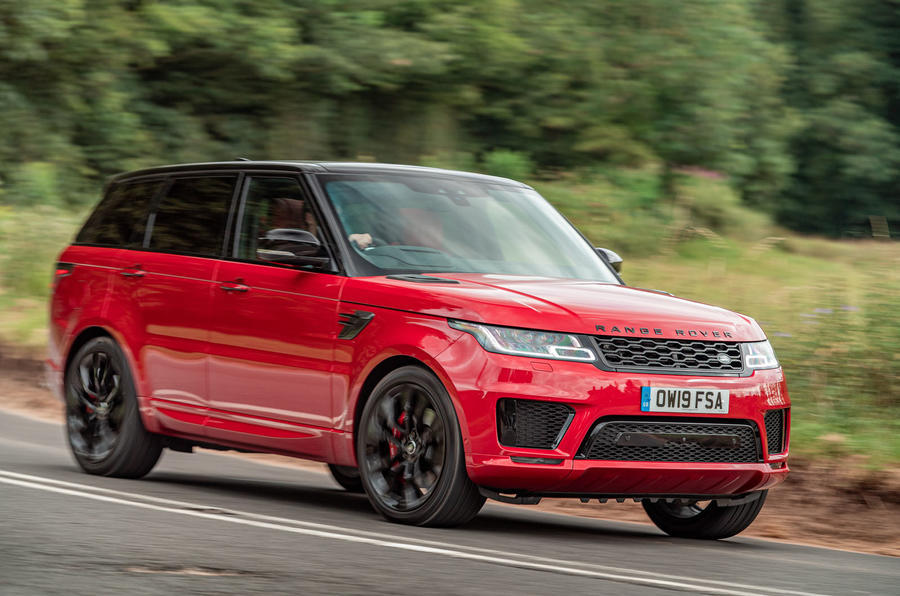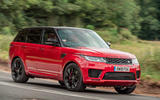Land Rover is set to introduce new mild-hybrid diesel engines to the Range Rover and Range Rover Sport in the coming months, effectively spelling an end to the V8 diesel, Autocar has learned.
After introducing its first mild-hybrid systems in four-cylinder powerplants for the new Evoque and Discovery Sport last year, the technology will be introduced in two new six-cylinder diesels. Land Rover hasn’t officially confirmed details, however.
It is understood that a 296bhp 3.0-litre MHEV unit, badged D300, will be offered on HSE, HSE Dynamic and Autobiography Dynamic trims of the Range Rover Sport. The mild-hybrid system will give a moderate efficiency boost, as well as aiding smooth stop/start driving thanks to an integrated starter-generator.
Exclusive: every new Range Rover coming until 2023
A new, more powerful version of that same engine putting out 345bhp (badged D350) will be available in higher-end trims such as HST. That unit will effectively replace the flagship Ford-sourced 4.4-litre diesel V8, currently built in Mexico and based on a 10-year-old design. Oddly, information for the new unit has already been published by automotive data suppliers, despite it not being listed by Land Rover itself.
The data reveals that the new unit puts out 516lb ft of torque, giving a 0-62mph time of 6.5sec and a top speed of 140mph in the Range Rover Sport. It also claims 35.3mpg and emits 210g/km of CO2. These figures are notably improved on the V8 diesel.
The same two engines will be added to the full-size Range Rover, with the 0-62mph of the D350 rising to 7.1sec and CO2 emissions up to 225g/km. The D350 will only be available on higher trims of the Range Rover, too.
We can also anticipate either one or both of these units to emerge on the Jaguar side with the upcoming facelift of the XF and F-Pace, originally expected to be unveiled by now but likely to be pushed back due to the coronavirus pandemic.
While it remains available to order, it is unclear if there is any intention to return the V8 diesel to the brand in future, but it’s unlikely given the relative inefficiency it offers next to six-cylinder alternatives. This unit is one of the last Ford-sourced engines to be produced, with production of the AJ petrol V8 to cease towards the end of this year at Ford’s Bridgend factory.
READ MORE
Range Rover EV to be most road-biased Land Rover yet
Jaguar Land Rover to invest £1bn in three new UK-built EVs
New £25k Land Rover to be followed by luxo-Defender













Join the debate
Add your comment
A nice engine, (tried the 3.6
A nice engine, (tried the 3.6 in a RRS =hilarious) replaced by an ever better and UK-made one as well. Weight will always be the enemy of fuel efficiency, so a lighter unit with similar power and hybrid modernity should be a no-brainer. 'Hybridisation' will eventually replace cylinder count as a bragging-right for the well-heeled in most markets.
The old V8/6D 'Lion' engine range is itself an unsung-hero of the automotive world, being largely modular with the more popular V6 format and surprisingly international: Originally a JV with Ford, JLR and PSA, it was a good as anything made in Germany, (tried it in several Jags) but PSA didn't use the V6 much and phased out its modified transverse version. JLR has been driving the development of the 3.0V6 (and V8) versions, with Ford benefitting somewhat from JLR's expertise by fitting it to US & AUS market vehicles.
Its not a "Ford sourced V8",
Its not a "Ford sourced V8", its a Ford/Peugeot joint engine.
Talking of Peugeot
Talking of Peugeot, compare and contrast how quickly PSA are dumping anything with GM roots following their acquisition of Vauxhall/Opel to avoid the paying fees to GM, compared to how JLR have still been using Ford-based engines, etc.
It is a Ford V8
The V8 used by JLR is all Ford. The jv with PSA was the 3.0 V6 Turbo Diesel (originally 2.7) still used in the XF & F Pace, but about to be replaced with their own straight six previewed in Defender
No, it was based on the Lion
No, it was based on the Lion V6 and originally built in Essex...
For a small comapny
It does take too long to role out accross the range. Then when you add restrictions such as top of the line range rover first it becomes very slow. Mercedes offer their new diesel in the E class so why JLR doesn't hard to know. No point being smallest and slowest to market.